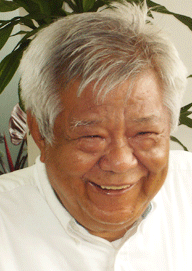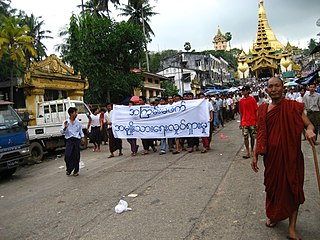Related Research Articles
A blog is a discussion or informational website published on the World Wide Web consisting of discrete, often informal diary-style text entries (posts). Posts are typically displayed in reverse chronological order, so that the most recent post appears first, at the top of the web page. Until 2009, blogs were usually the work of a single individual, occasionally of a small group, and often covered a single subject or topic. In the 2010s, "multi-author blogs" (MABs) emerged, featuring the writing of multiple authors and sometimes professionally edited. MABs from newspapers, other media outlets, universities, think tanks, advocacy groups, and similar institutions account for an increasing quantity of blog traffic. The rise of Twitter and other "microblogging" systems helps integrate MABs and single-author blogs into the news media. Blog can also be used as a verb, meaning to maintain or add content to a blog.
Blogger is an American online content management system which enables multi-user blogs with time-stamped entries. Pyra Labs developed it before being acquired by Google in 2003. Google hosts the blogs, which can be accessed through a subdomain of blogspot.com. Blogs can also be accessed from a user-owned custom domain by using DNS facilities to direct a domain to Google's servers. A user can have up to 100 blogs or websites per account.
The blogosphere is made up of all blogs and their interconnections. The term implies that blogs exist together as a connected community or as a social networking service in which everyday authors can publish their opinions.
A warblog or milblog is a weblog devoted mostly or wholly to covering news events concerning an ongoing war. Sometimes the use of the term "warblog" implies that the blog concerned has a pro-war slant. The term "milblog" implies that the author is with the military.
Following a crackdown on Iranian media beginning in 2000 many Iranians turned to weblogging to provide and find political news. The first Persian language blog is thought to have been created by Hossein Derakhshan,, in 2001. Derakhshan also provided readers with a simple instruction manual in Persian on how to start a blog. In 2004, a census of blogs around the world by the NITLE found 64,000 Persian language blogs. In that year the Islamic government also began to arrest and charge bloggers as political dissidents and by 2005 dozens of bloggers had been arrested.

The Internet in Myanmar has been available since 2000 when the first Internet connections were established. Beginning in September 2011, historically-pervasive levels of Internet censorship in Burma were significantly reduced. Prior to September 2011, the military government worked aggressively to limit and control Internet access through software-based censorship, infrastructure and technical constraints, and laws and regulations with large fines and lengthy prison sentences for violators. In 2015, internet usage significantly increased to 12.6% with the introduction of faster mobile 3G internet by transnational telecommunication companies Telenor Myanmar and Ooredoo Myanmar, later joined by national Myanmar Post and Telecommunications (MPT). While the Internet situation in Myanmar has undergone change since its introduction in 2010 and reduction of censorship in 2011, laws such as the 2013 Telecommunications Law continue to restrict citizens from total freedom online. Despite restrictions, internet penetration continues to grow across the country.

U Tin Moe (1933-2007) was a Burmese poet.

The Saffron Revolution was a series of economic and political protests and demonstrations that took place during August, September, and October 2007 in Myanmar. The protests were triggered by the decision of the national military government to remove subsidies on the sales prices of fuel. The national government is the only supplier of fuels and the removal of the price subsidy immediately caused diesel and petrol prices to increase by 66–100% and the price of compressed natural gas for buses to increase 500% in less than a week.

John Aravosis is an American Democratic political consultant, journalist, civil rights advocate, and blogger. Aravosis, an attorney who lives in Washington D.C., is the founder and executive editor of AMERICAblog.

Wael Abbas Bilal is an internationally renowned Egyptian journalist, blogger, and human rights activist, who blogs at Misr Digital. He reported an incident of mob harassment of women, and broadcast several videos of police brutality. His actions led to the conviction of police for torture, but he has been harassed by the Egyptian government, and his accounts with YouTube and Yahoo were closed. YouTube has since restored his account and most of his videos. Facebook had deleted Wael's account but it has since been restored.

Fouad Ahmad Alfarhan is a popular Saudi Arabian blogger and political commentator noted for his advocacy of political reforms on his blog. Farhan is unusual among Saudi Arabian bloggers because he uses his real name rather than blogging under a pseudonym. Farhan had stopped blogging for a period after being told by government officials to "tone down" his commentary. He resumed posting in July 2007. On Tuesday, December 10, 2007 Farhan was arrested in Jeddah. The arrest was reported by other Arab bloggers, and Saudi authorities confirmed he was being held for "interrogation." No official charges were relayed. He was held in solitary confinement without charges. He was released from prison on April 26, 2008.
Events from the year 2007 in Myanmar:
While the term "blog" was not coined until the late 1990s, the history of blogging starts with several digital precursors to it. Before "blogging" became popular, digital communities took many forms, including Usenet, commercial online services such as GEnie, BiX and the early CompuServe, e-mail lists and Bulletin Board Systems (BBS). In the 1990s, Internet forum software, such as WebEx, created running conversations with "threads". Threads are topical connections between messages on a metaphorical "corkboard". Some have likened blogging to the Mass-Observation project of the mid-20th century.

The Burmese Wikipedia is the Burmese language edition of the free online encyclopedia Wikipedia. This edition was started in July 2004, and has about 104,000 articles as of August 2022.

Yoani María Sánchez Cordero is a Cuban blogger who has achieved international fame and multiple international awards for her critical portrayal of life in Cuba under its current government.
The 2010 cyberattacks on Myanmar were distributed denial-of-service attacks (DDoS) that began on 25 October, occurring ahead of the 2010 Burmese general election, which is widely viewed as a sham election. This election was the first that Burma had had in 20 years. The attacks were significantly larger than attacks against Estonia and Georgia in 2007 and 2008 respectively. The attack followed a similar one on 1 February 2010, and also followed an incident of a total loss of connection to the internet the previous spring when a submarine communications cable was severed accidentally.
An anonymous blog is a blog without any acknowledged author or contributor. Anonymous bloggers may achieve anonymity through the simple use of a pseudonym, or through more sophisticated techniques such as layered encryption routing, manipulation of post dates, or posting only from publicly accessible computers. Motivations for posting anonymously include a desire for privacy or fear of retribution by an employer, a government, or another group.
Zawgyi font is a predominant typeface used for Burmese language text on websites. It is also known as Zawgyi-One or zawgyi1 font although updated versions of this font were not named Zawgyi-two. Prior to 2019, it was the most popular font on Burmese websites.
Wirathu is a Burmese Buddhist monk, and the leader of the extremist 969 Movement in Myanmar. He has been accused of supporting the persecution of Muslims in Myanmar through his speeches, although he claims to be a peaceful preacher and not to have advocated violence—which is disputed by others. Facebook banned his page on the charge of spreading religious hatred towards other communities, after repeated warnings to not post religiously inflammatory content.
The Patriotic Association of Myanmar, abbreviated Ma Ba Tha (မဘသ) in Burmese and variously translated into English as Association for the Protection of Race and Religion, Organisation for the Protection of Race and Religion and Committee for the Protection of Nationality and Religion is an ultra nationalist Buddhist organisation based in Myanmar (Burma). Some PAB members are connected to the 969 Movement.
References
- ↑ "Zawgyi - ေဇာ္ဂ်ီ - Home". Archived from the original on 2012-06-28. Retrieved 2014-01-07.
- ↑ MBS (Myanmar Bloggers Society) Archived September 5, 2011, at the Wayback Machine
- ↑ 2007 Burmese anti-government protests
- ↑ Inc, IBP (2013). Myanmar Internet and E-Commerce Investment and Business Guide - Regulations and Opportunities. Lulu.com. ISBN 978-1-4387-3445-3.
- ↑ "Myanmar blogger jailed for 20 years - CNN.com". CNN. 11 November 2008.
- ↑ "After four years in jail, Burmese blogger finds country on cusp of change". The France 24 Observers. 25 January 2012.
- ↑ "Blogging for Burma".
- ↑ "Gli ambasciatori del Nobel a Internet".
- ↑ "In mostra i volti dei costruttori di pace via web".